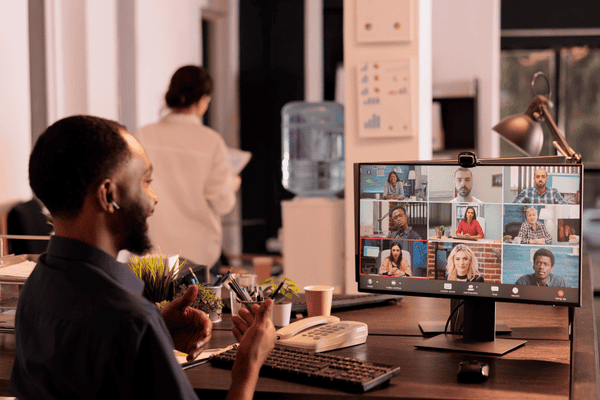Unlock the full potential of your distributed team with smart strategies for growth and learning in a remote work environment.
The Remote Work Revolution: A Double-Edged Sword

The rise of remote work has changed the way businesses operate, offering unparalleled flexibility and access to global talent. However, with these benefits come challenges—especially when it comes to encouraging skill development among remote workers. Unlike traditional office setups, remote teams require new approaches to ensure continuous learning and growth.
While in-office employees can easily learn through spontaneous discussions, hands-on mentorship, and in-person training sessions, remote workers rely on structured processes, digital tools, and a culture that actively promotes learning. Without these elements in place, employees may feel stagnant, disengaged, or even detached from their professional growth trajectory.
Why Skill Development Matters Even More in Remote Teams
For remote teams, skill development fuels both individual and collective success. It not only boosts productivity and engagement but also future-proofs businesses in an ever-changing market. Companies that prioritize learning see:
- Higher employee retention: Employees who feel invested in are more likely to stay with the company long-term.
- Increased job satisfaction: Professional growth contributes to motivation and engagement.
- Enhanced problem-solving abilities: A well-trained workforce can tackle challenges more effectively.
- A stronger bottom line: Continuous learning leads to innovation and higher efficiency.
With these benefits in mind, let’s explore practical strategies to promote skill development in remote teams.
1. Cultivate a Growth-First Mindset Across Your Remote Team

A workplace culture that prioritizes learning will naturally encourage employees to take charge of their professional development. A growth-first mindset empowers employees to see challenges as learning opportunities rather than obstacles.
How to Foster a Growth-First Mindset
- Normalize improvement over perfection: Instead of solely focusing on outcomes, celebrate progress, learning moments, and incremental improvements.
- Share success stories: Highlight team members who have upskilled and leveraged new competencies to grow within the company.
- Lead by example: Managers should openly discuss their own learning journeys and demonstrate their commitment to continuous improvement.
2. Go Beyond Zoom Calls: Build Learning Ecosystems
While video meetings play a role in remote work, true skill development requires a robust learning ecosystem. Supplement daily tasks with tools and platforms designed for professional growth.
How to Create a Learning Ecosystem
- Leverage online courses: Platforms like LinkedIn Learning, Udemy, or Coursera offer a vast range of courses tailored to different industries.
- Create an internal resource hub: Maintain a virtual library with access to articles, training materials, recorded webinars, and eBooks.
- Host interactive workshops: Conduct live, skill-building sessions where employees can ask questions, engage in discussions, and practice new techniques.
- Encourage participation in industry events: Sponsor employees to attend virtual conferences and webinars relevant to their roles.
3. Personalized Development Plans: One Size Doesn’t Fit All
Each remote worker has unique skills, goals, and aspirations. A personalized approach ensures that employees receive relevant training aligned with their career growth and business objectives.
Steps to Develop Personalized Learning Plans
- Assess current skills: Conduct skills gap analyses through surveys, performance reviews, or self-assessments.
- Set actionable goals: Align learning objectives with both the employee’s career path and the company’s strategic direction.
- Provide tailored resources: Offer specific courses, mentorship, or stretch projects based on individual learning needs.
- Monitor progress: Regularly review goals, celebrate milestones, and adjust the development plan as needed.
4. Create Skill-Sharing Circles That Build Team Connection
Learning isn’t just about consuming information—it thrives in an environment of knowledge exchange. Peer-to-peer learning fosters collaboration and strengthens team bonds, even in remote settings.
How to Encourage Peer Learning
- Virtual workshops: Employees can lead training sessions based on their areas of expertise.
- Dedicated knowledge-sharing Slack channels: Create spaces where employees can share articles, tools, and tutorials.
- Mentorship programs: Pair experienced employees with newer team members to aid in knowledge transfer and career development.
- Shadowing opportunities: Allow employees to observe or collaborate with colleagues in different roles for cross-functional learning.
5. Encourage Experimentation Over Perfection
Remote workers need a safe space to take risks, make mistakes, and grow from their experiences. A culture that prioritizes learning over perfection empowers employees to innovate and push boundaries.
How to Cultivate a Learning-Through-Experience Culture
- Assign stretch projects: Encourage employees to take on tasks slightly outside their comfort zones to build new skills.
- Offer mentorship support: Connect employees with senior colleagues who can guide them as they explore new areas.
- Reframe failure as growth: Normalize discussions around challenges and what can be learned from them.
6. Leverage Technology to Track and Celebrate Growth
Technology plays a crucial role in monitoring learning progress and keeping employees motivated. By tracking skill development, managers can identify areas of improvement and celebrate milestones.
Tools for Tracking and Motivating Growth
- Progress dashboards: Use tools like Trello, Asana, or Notion to track individual and team development.
- Gamified learning platforms: Apps with leaderboards, badges, and challenges add a fun, competitive element to training.
- Recognition programs: Celebrate achievements through virtual shoutouts, reward programs, or personalized incentives.
7. Check-In Often, but Don’t Check Out Their Autonomy
While guidance is essential, remote workers also value independence. Striking a balance between support and autonomy ensures employees remain engaged without feeling micromanaged.
Best Practices for Effective Check-Ins
- Schedule regular feedback sessions: Use these as opportunities for employees to share learning experiences and receive constructive advice.
- Encourage self-directed learning: Provide access to training resources but allow employees to set their own learning pace.
- Trust employees to own their development: Instead of mandating training, empower employees to choose learning paths that align with their interests and career goals.
8. Incentives That Inspire: Reward Learning, Not Just Results
Motivation plays a significant role in skill development. Rewarding learning efforts reinforces the importance of continuous growth.
Ways to Reward Learning
- Performance bonuses: Tie rewards to skill development milestones.
- Public recognition: Acknowledge achievements in team meetings or internal newsletters.
- Upskilling perks: Offer stipends for courses, certifications, or training programs.
Future-Proofing Your Remote Workforce Through Growth
Skill development is a win-win for employees and businesses alike. By fostering continuous growth, you not only prepare your remote team for the future but also create a thriving, engaged workforce. Companies that prioritize learning will remain competitive, retain top talent, and drive innovation in their industries.
The First Step Starts Today
Ready to enhance your team by hiring top-tier remote talent? Get started with DigiWorks and empower your business with globally sourced, highly vetted professionals who are eager to learn and grow.







